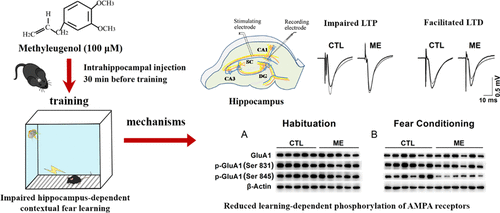当前位置:
X-MOL 学术
›
J. Agric. Food Chem.
›
论文详情
Our official English website, www.x-mol.net, welcomes your
feedback! (Note: you will need to create a separate account there.)
Acute Administration of Methyleugenol Impairs Hippocampus-Dependent Contextual Fear Memory and Increases Anxiety-like Behavior in Mice.
Journal of Agricultural and Food Chemistry ( IF 5.7 ) Pub Date : 2020-06-18 , DOI: 10.1021/acs.jafc.0c01863 Kai-Fei Guo 1, 2 , Man Dai 1 , Yi-Miao Liu 1 , Ji-Chuan Zhang 3 , Yan-Mei Chen 3 , Hui Ye 2 , Man-Bi Li 4 , Rong-Rong Mao 5 , Jun Cao 1
Journal of Agricultural and Food Chemistry ( IF 5.7 ) Pub Date : 2020-06-18 , DOI: 10.1021/acs.jafc.0c01863 Kai-Fei Guo 1, 2 , Man Dai 1 , Yi-Miao Liu 1 , Ji-Chuan Zhang 3 , Yan-Mei Chen 3 , Hui Ye 2 , Man-Bi Li 4 , Rong-Rong Mao 5 , Jun Cao 1
Affiliation

|
Methyleugenol (ME) as a natural essential oil in many plant species is widely used in human food and beverage for its fragrance and possible beneficial health effects. Previous chronic or subacute studies in rodents show that ME mainly causes liver toxicity. However, whether and how acute ME affects the central nervous system still remain elusive. Here, we found that ME administrated into the hippocampus impaired the acquisition of hippocampus-dependent contextual fear memory in mice (ME vs control: repeated-measures two-way ANOVA, F(5,70) = 2.937, p < 0.05; Fisher test, p < 0.05, respectively, 53 ± 5.2% vs 73 ± 7.6% during trial 4 and 46.8 ± 6% vs 74.5 ± 9.3% during trial 5). Meanwhile, acute ME impaired hippocampal CA1 long-term potentiation (LTP; ME vs control: independent t-test, p < 0.01, 110.6 ± 1.8% vs 133.3 ± 5.6%) while facilitated long-term depression (LTD; p < 0.01, 75.7 ± 3.4% vs 88.6 ± 1.7%) in mice brain slices and inducing a decrease in learning-dependent phosphorylation of Ser831 (ME vs control: independent t-test, p < 0.001, 0.87 ± 0.03 vs 1.23 ± 0.03) and Ser845 (p < 0.01, 0.42 ± 0.07 vs 0.97 ± 0.14) sites of excitatory glutamate AMPA receptor subunit 1 (GluA1) in the hippocampus, which may be the underlying mechanisms of impairment of hippocampus-dependent learning. In addition, intrahippocampal infusion of ME also increased anxiety-like behaviors in mice. These results suggested that acute ME impaired the hippocampus function at behavioral, cellular, and molecular levels, indicating the potential risks of ME on the central nervous system.
中文翻译:

甲基丁香酚的急性给药会损害海马依赖性上下文恐惧记忆并增加小鼠的焦虑样行为。
甲基丁香酚(ME)作为许多植物物种中的天然香精油,因其香味和可能的有益健康作用而广泛用于人类食品和饮料。先前在啮齿动物中进行的慢性或亚急性研究表明,ME主要引起肝脏毒性。但是,急性ME是否以及如何影响中枢神经系统仍不清楚。在这里,我们发现对海马给药的ME损害了小鼠海马依赖性上下文恐惧记忆的获得(ME与对照:重复测量双向ANOVA,F (5,70) = 2.937,p <0.05; Fisher检验,p<0.05,分别在试验4中为53±5.2%对73±7.6%,在试验5中为46.8±6%对74.5±9.3%。同时,急性ME损害了海马CA1的长期增强作用(LTP; ME与对照:独立的t检验,p <0.01,110.6±1.8%对133.3±5.6%),而促进了长期抑郁(LTD;p <0.01, (75.7±3.4%vs 88.6±1.7%)在小鼠的脑片中,并诱导了Ser831的学习依赖性磷酸化的降低(ME与对照:独立t检验,p <0.001、0.87±0.03 vs 1.23±0.03)和Ser845(p<0.01、0.42±0.07 vs 0.97±0.14)的海马兴奋性谷氨酸AMPA受体亚基1(GluA1)位点,这可能是海马依赖学习障碍的潜在机制。此外,海马内注射ME也增加了小鼠的焦虑样行为。这些结果表明,急性ME会在行为,细胞和分子水平上损害海马功能,表明ME对中枢神经系统的潜在风险。
更新日期:2020-07-15
中文翻译:

甲基丁香酚的急性给药会损害海马依赖性上下文恐惧记忆并增加小鼠的焦虑样行为。
甲基丁香酚(ME)作为许多植物物种中的天然香精油,因其香味和可能的有益健康作用而广泛用于人类食品和饮料。先前在啮齿动物中进行的慢性或亚急性研究表明,ME主要引起肝脏毒性。但是,急性ME是否以及如何影响中枢神经系统仍不清楚。在这里,我们发现对海马给药的ME损害了小鼠海马依赖性上下文恐惧记忆的获得(ME与对照:重复测量双向ANOVA,F (5,70) = 2.937,p <0.05; Fisher检验,p<0.05,分别在试验4中为53±5.2%对73±7.6%,在试验5中为46.8±6%对74.5±9.3%。同时,急性ME损害了海马CA1的长期增强作用(LTP; ME与对照:独立的t检验,p <0.01,110.6±1.8%对133.3±5.6%),而促进了长期抑郁(LTD;p <0.01, (75.7±3.4%vs 88.6±1.7%)在小鼠的脑片中,并诱导了Ser831的学习依赖性磷酸化的降低(ME与对照:独立t检验,p <0.001、0.87±0.03 vs 1.23±0.03)和Ser845(p<0.01、0.42±0.07 vs 0.97±0.14)的海马兴奋性谷氨酸AMPA受体亚基1(GluA1)位点,这可能是海马依赖学习障碍的潜在机制。此外,海马内注射ME也增加了小鼠的焦虑样行为。这些结果表明,急性ME会在行为,细胞和分子水平上损害海马功能,表明ME对中枢神经系统的潜在风险。











































 京公网安备 11010802027423号
京公网安备 11010802027423号